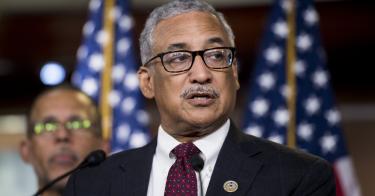Rep. Bobby Scott, Virginia Democrat, has introduced a bill that would more than double the federal minimum wage to $15 per hour by 2024.
Higher wages are great when they come from a thriving economy where jobs are plentiful and ample investment makes workers more productive. But it’s not all roses and sunshine when higher wages come from government fiat. Consider a business with seven minimum wage workers. Doubling those wages will cost the small-business owner an extra $122,000 per year.
To cover those expenses, a business operating on the typical 10 percent profit margin would have to boost annual sales by $1.2 million — a near impossibility for most small businesses.
To pay higher hourly wages without running in the red, most businesses will have to raise prices (which can lower business volume) or cut costs. The latter is done through layoffs, reducing workers’ hours or benefits, raising prices, or forgoing investments in the business. None of those things is good for workers or the business’s long-term success.
This is not just economic theory. It’s already playing out in places that have “gone big” on minimum wages.
Economists assessing the effects of the first two stages of Seattle’s wage increase (from $9.47 an hour to roughly $13) found little benefit, but major disruptions. Low-wage workers as a whole averaged $10 more per week, but only the most experienced pocketed the gains (some of which came from finding work at lower wages outside the city).
Less experienced workers saw their hours cut. They had to go outside the city to find additional work, and their incomes didn’t rise. Meanwhile, the rate of new entrants into Seattle’s workforce declined.
The study’s authors cautioned that the jump to $15 could keep the minimum wage from serving as an “avenue of advancement,” thereby hurting entry-level workers.
Closer to home, an analysis of the potential effects of a $15 minimum wage in Montgomery County, Maryland, concluded that one of every three low-wage jobs would disappear, and low-wage workers’ incomes would decrease by $360 million each year. Moreover, the county was projected to lose millions of dollars annually due to lower revenues and higher operating expenses. After reading the report, the county executive (previously a wage-increase supporter) promptly vetoed the measure.
Those would be the consequences for a wealthy county where the minimum wage already stands at $11.50.
A 2016 Heritage Foundation analysis found a national $15 minimum wage would cost 7 million jobs, with lower cost-of-living areas suffering the most. And even liberal economists question the merits of a $15 federal minimum wage.
Alan Krueger, former chairman of President Obama’s Council of Economic Advisers, called a $15 minimum wage “a risk not worth taking,” one that would “put us in uncharted waters, and risk undesirable and unintended consequences.”
And Clinton administration economist Harry Holzer cautioned that a $15 minimum wage would be “extremely risky,” particularly for young and less-educated workers who need to gain work experience.
A $15 minimum wage essentially drives out all jobs that don’t produce at least $35,000 per year — the annual cost of a minimum wage worker including wages and federal taxes.
Everyone wants workers to make good money, but not if it means no jobs or lower incomes for others. In the case of a $15 minimum wage, the ends simply do not justify the means.
That doesn’t mean lawmakers shouldn’t pursue policies that would increase wages, particularly for low-income workers.
Congress could enact universal savings accounts and eliminate double taxation on savings to help increase investment and make workers more productive. Policymakers could also reduce unnecessary regulations on employers that drive up their costs and leave them with fewer resources to compensate their employees.
And finally, Congress could rein in unsustainable government spending so that younger workers and future generations do not face the prospect of government taking more than half of their wages to help pay for the irresponsible largesse of past and current lawmakers.
This piece originally appeared in The Washington Times



